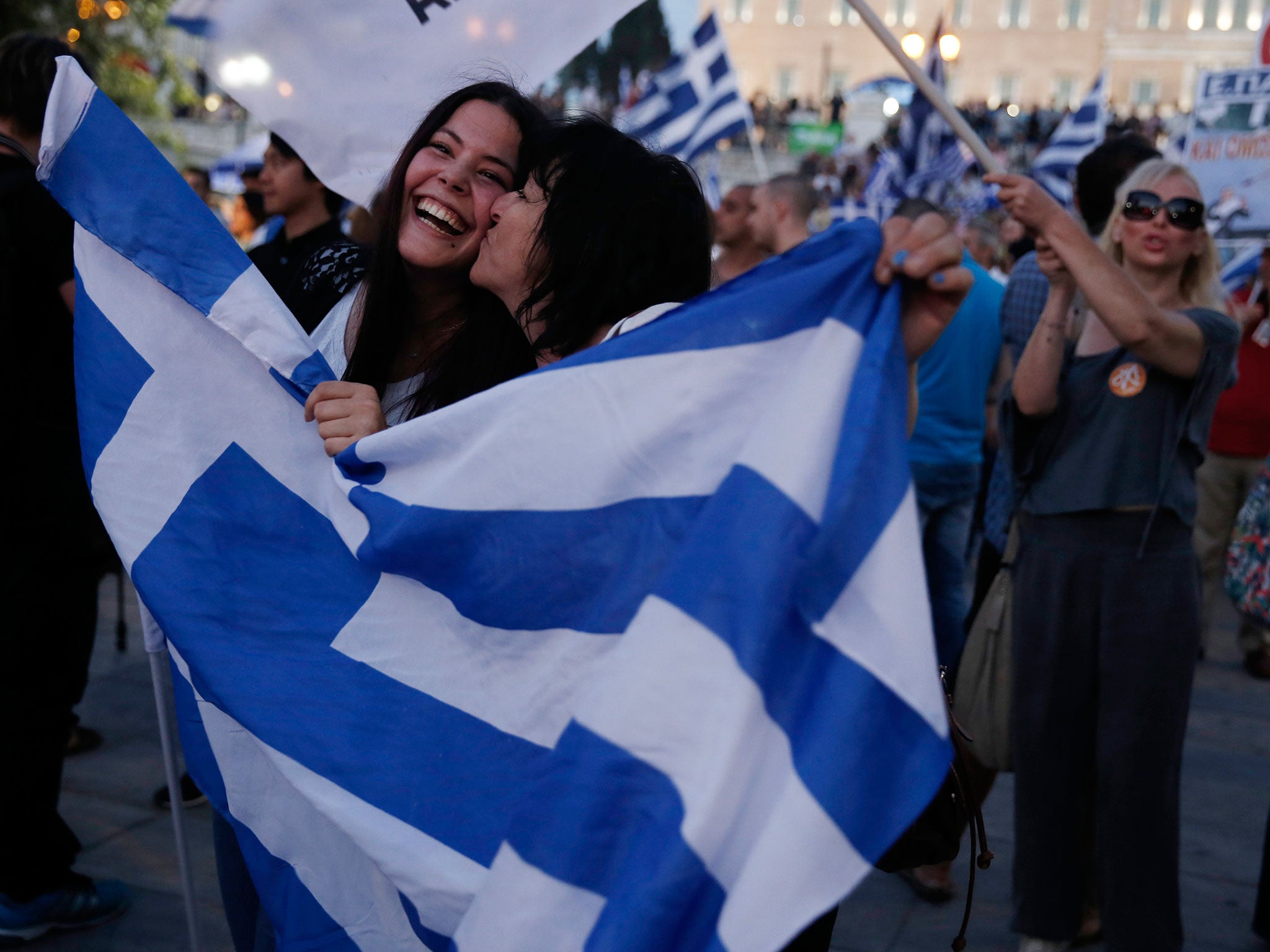Greece referendum: Greeks don't want to leave Europe, but Europe wants revenge on the Greeks
In the EU the majority is supposed to win, and is supposed to support the EU

Your support helps us to tell the story
From reproductive rights to climate change to Big Tech, The Independent is on the ground when the story is developing. Whether it's investigating the financials of Elon Musk's pro-Trump PAC or producing our latest documentary, 'The A Word', which shines a light on the American women fighting for reproductive rights, we know how important it is to parse out the facts from the messaging.
At such a critical moment in US history, we need reporters on the ground. Your donation allows us to keep sending journalists to speak to both sides of the story.
The Independent is trusted by Americans across the entire political spectrum. And unlike many other quality news outlets, we choose not to lock Americans out of our reporting and analysis with paywalls. We believe quality journalism should be available to everyone, paid for by those who can afford it.
Your support makes all the difference.At the voting booth in Kipseli Street in the heart of Athens, I met the finest Greeks. The first has to be Angelika Dimitriades who is 96 – she doesn’t look it for a moment, with her carefully combed white hair – but who had ticked the Yes box because, she told me, “I am a European”.
I should add that Mrs Dimitriades, who was driven to vote at the 60th High School Gymnasium by her son, was born in Istanbul – a child of the terrible population exchange between Greece and Turkey – and survived untouched throughout the Mataxos regime, the German occupation, the civil war (Athens was communist) and still she wished to be a European. No wonder hers was a Yes vote.
The Greek Prime Minister told us the winner of this referendum was democracy. Was that what victory for the No vote meant later in the day? I rather thought, at the polling station, that both the Yes and the No camps had won – for disturbingly opposite reasons.
But I suspect the EU nations will not take so friendly a view of the No voters. In the EU, the majority is supposed to win, and they are supposed to support the European Union.
The Noes cared about the poor and they distrusted Europe, but the “Yeses” cared about Greece, and also distrusted Europe. Michaelis Gelasakis, for example – who was actually born in Montreal (no, he doesn’t have a Canadian passport) – thought that this was not about whether Greece would stay in the EU, “but whether we can continue negotiating”.
Many people who voted No thought they were bargaining for more talks. Michaelis voted Yes because he didn’t want the drachma back but thought there was “no meaning” to the referendum because the deal being voted on was already off the table.
But, remarkably, all the voters in Kipseli Street believed in the euro. Take the husband and wife psychologists Stematos and Katarina (aged 70 and 56 respectively) who voted No because they wanted an end to the “denigration of dignity” which poverty had brought to Greece. Yes, they said, there was a risk of a “civil split” from the euro, but people understood the problems and they wanted to stay in the European Union. “Of course, I would want any country to pay back the euros it owes – but in a facilitated way that has consideration for the people. We must protect the poor although we know the losses are getting worse.”
It was quite remarkable how many Greeks spoke about the Middle East – the Palestinians, especially – but also about their desire to be European. In fact, there was not a man or woman in Kipseli who did not want to be a European. But they wanted to believe they were European – they wanted to feel that they were democrats in the literal (rather than the Prime Minister’s version) of the word.

One man’s grandmother had been born in Istanbul but declared that those days were “over and gone”. Surprising, isn’t it, how little Turkey has come into the Greek economic debate? But perhaps that is because Turkey, which would like to join the EU, has been repulsed by the Europeans but is, economically, doing rather well.
I didn’t find anyone who thought the banks would be open on Tuesday, as promised by the Finance Minister. In fact, one young man turned out to be a Greek banker in the “recovery” department of his institution, given the task of getting debtors to pay up. But he insisted (he was a No voter) that debtors must be helped to pay, and that the banks could be open in a week from today.
Another voter brought up the name of Eleftherious Venizelos, the man who fought the Ottomans and was the father of Greek independence. “If we had Venizelos now,” he said, “we would not have had this situation – because he turned negative opinions into positive opinions.” Which is true, up to a point. The problem, though, is that Mr Tsipras turns negative opinions into even more negative opinions and regards optimism as an exclusive tool of his own Syriza government.
That is why Syriza likes to draw attention to the Irish vote against the EU Lisbon agreement which led – so the Greeks claim – to EU compromises. It’s a rather false analogy. After all, this is a Greek government that tried to pretend the referendum was about membership of the EU, which the Irish never pretended to do.
But now let’s come down to the facts which voters do not explain too precisely. If the vote had turned out to be for the “Yeses”, Syriza could have claimed it had won – that the people wished to remain European and thus it had a right to demand that its Prime Minister be allowed to renegotiate the deal. But with a No, Syriza can claim it has won – that its people (like Syriza) want to remain in Europe and have a right to renegotiate… etc etc.
It all sounds very Greek. I’m not sure if this is an exercise in democracy (Greek style) or if democracy is the “winner” in the referendum. But the Greeks clearly don’t want to leave Europe. Which raises a problem; because the EU and the great bankers of the West have come to look, over these past few weeks, not like justified and generous gentlemen and gentlewomen who gave their generosity to Greece, but rather as vicious money-lenders who want their revenge on the poor old Greeks.
The real question to be asked, is surely whether any of us in future will want to be called “Europeans”.
Join our commenting forum
Join thought-provoking conversations, follow other Independent readers and see their replies
Comments